This video does not contain audio

Launching a Successful Speaker Series
Bucknell University is giving diverse viewpoints the stage. Learn how we're doing it — and how your institution can benefit from a marquee speaker series.
Colleges and universities position their institutions as dynamic hubs where academic inquiry, intellectual curiosity and open dialogue thrive.
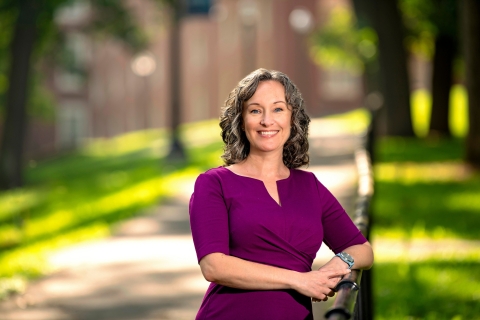
Following a COVID-19 hiatus, the Bucknell Forum resumed in 2022 under the leadership of Heather Johns, vice president for marketing and communications.
But cultivating an environment that achieves a balanced mix of voices has become a high-stakes endeavor that draws criticism from both sides of the spectrum. Amid these tensions, Bucknell University has devised a way to demonstrate its commitment to academic freedom. It has reinvigorated a national speaker series as a tangible example of how the institution values the free exchange of ideas on campus.
Heather Johns, vice president for marketing & communications, shares tips for launching your institution's own speaker series to advance and achieve strategic goals.
Start now
Planning an event of this magnitude takes time. Johns' team starts planning a year in advance. It also takes time to obtain institutional support and funding, so it's important to factor that in.
Form a task force
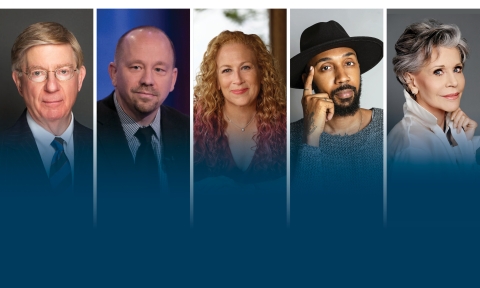
Bucknell Forum 2023-24 speakers (L to R): George Will, Jon A. Shields, Jodi Picoult, George M. Johnson and Jane Fonda.
On the heels of the pandemic, Johns and her communications colleagues were responsible for restarting the speaker series in 2022. Going forward, Johns will co-lead a Bucknell Forum task force comprising students, faculty and staff — though the Division of Communications will remain responsible for the nuts and bolts of contracts, event planning and talent management. "The task force will be valuable in determining the annual theme and selecting the speakers," she says. "Having faculty members and students invested in the event will also help with word-of-mouth marketing to two key audiences we really want to attend."
Develop a theme
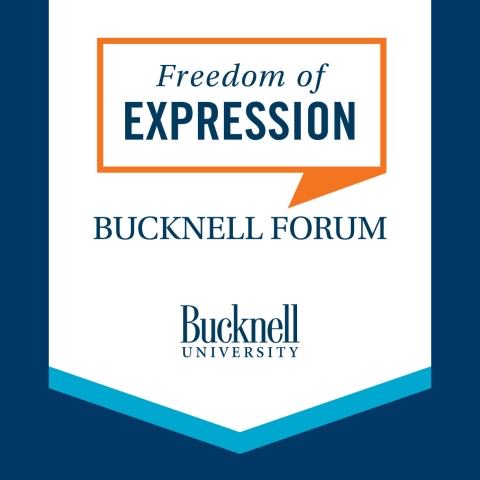
The 2023-24 Forum will explore freedom of expression in contemporary society.
A theme is helpful in focusing a speaker series. It should appeal to a broad audience and allow for speakers with a range of viewpoints. It should also tie to a relevant topic that can generate interest across campus and have educational value.
Partner with a speakers bureau
A speakers bureau can provide a roster of suggested speakers and assist with negotiations, logistics and contracts. Speaker preferences vary, so be sure to determine in advance whether they will agree to speak with student groups or media; allow their talk to be recorded; or answer audience questions.
Start with the headliner
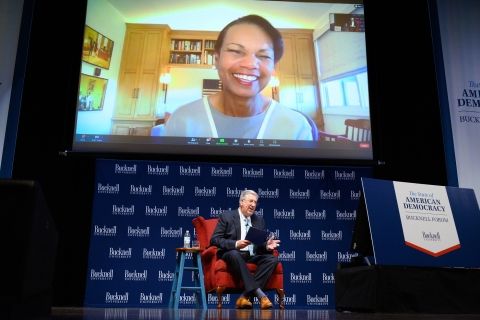
The 2022-23 Forum began with a virtual appearance by Condoleezza Rice, who spoke with Bucknell President John Bravman.
Johns' strategy for building a speaker lineup is to first identify one marquee speaker with instant name recognition. Once that person is secured, she then works backward to fill in the remaining spots. Identifying speakers that fit your budget, align with your academic and events calendars, and provide diverse perspectives from each other "is a complex puzzle," Johns says.
Determine location
Despite the prevalence of Zoom, the Bucknell Forum is an in-person event. (One exception was Condoleezza Rice, who addressed an auditorium audience virtually.) "There is an excitement that comes from seeing a high-profile speaker in person," Johns says. Most Forum events are held in the campus performing arts center — which hosts a multitude of other events, also planned a year or more in advance — so coordinating schedules early is part of the process. It's also important to consider the size of the venue to help ensure a positive impression of turnout.
Be flexible
Some speakers prefer a conversational sit-down. Others want to deliver a keynote. The Bucknell Forum is designed to allow for either approach. Most of the recent events have begun with an on-stage conversation between the guest and Bucknell President John Bravman followed by an audience Q&A. For a conversation with the president, Johns says all speakers expect the institution to submit questions months in advance.
Extend the event's educational value
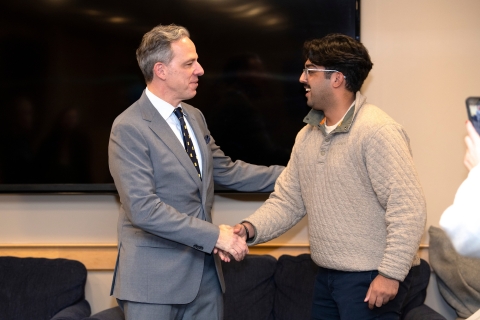
Classroom visits and discussion sessions extend the educational value of the Forum.
Bucknell requests speakers to arrive on campus a few hours ahead of the evening event to engage with students. Johns has partnered with faculty members to organize opportunities for students to interact with speakers.
Get the word out
Johns' team employs all its communications vehicles — university website, social media, internal message board, media coverage — to promote the Forum. On-the-ground techniques, including tabling at high-traffic areas on campus in the days leading up to each speaker's visit, drum up interest among students.
Consider access
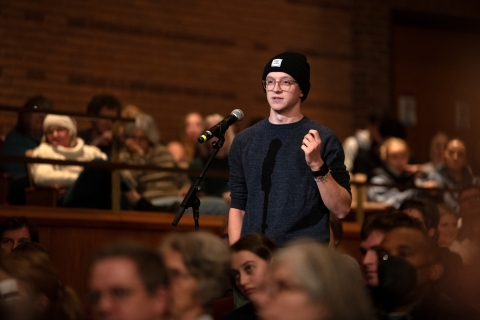
A student speaks to Jake Tapper during a question-and-answer session at a Forum event.
The Bucknell Forum is free, open to the public and features a sign-language interpreter. While community members are invited, students are always prioritized. "My idea of success is to have an event that's so interesting to our students there are very few seats left for community members," Johns says. To ensure students have first access, tickets for off-campus community members are only available the day of the event — after students, faculty and staff have secured their seats — and are limited to two.
Launching a speaker series is a major undertaking that requires significant time and resources. Johns is open to helping other institutions and welcomes questions; she can be reached at heather.johns@bucknell.edu.
More about the Bucknell Forum
The 2023-24 Forum will explore "Freedom of Expression" with headliners including Jane Fonda, George Will and Jodi Picoult.
2023-24 Lineup

The Democratic strategist and Republican former governor found common ground in a discussion with President John Bravman.
2022-23: David Axelrod & John Kasich

The CNN anchor offered insight into polarization, disinformation and the role of the media in American politics.
2022-23: Jake Tapper

The former secretary of state and White House national security adviser was the first speaker in the Forum's post-pandemic return.
2022-23: Condoleezza Rice
